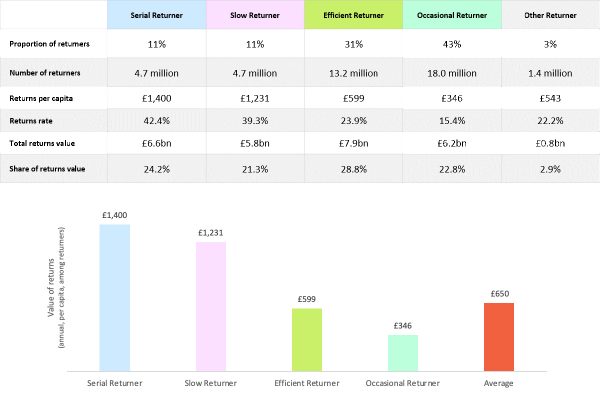Would you be in favour of a mandatory returns fee for all online returns regardless if the sale took place on a marketplace, your website or social media? That’s what the Returns Management Research Group of the University of Bamberg are suggesting – a legally prescribed fixed return fee of around €2.95 (close to £2.50). They reckon that charging a mandatory returns fee could lower the total number of ecommerce returns by around 16%.
With an explosion in online shopping there has also been an explosion in online returns and this is not only costly for retailers but also bad for the environment. The University of Bamberg study results suggest that even a low statutory return fee could be a tool to get online returns under control although they also point out that better pre-sales information is also needed, particularly around sizing for clothing to give consumers confidence that a garment will fit.
Better standardised pre-sales information coupled with a returns fee could be all that’s needed to stop shoppers ordering multiple sizes safe in the knowledge that they can return any unwanted products. the size of clothing is currently not very meaningful, which leads to many online returns and the group call for manufacturers to use binding, standardized size specifications.
The research group surveyed 139 German retailers who sell online.
“The results show that many mail order companies are making great efforts to lower the article-related returns rates. Nevertheless, customer behaviour has not changed noticeably. The potential of classic preventative measures, for example better article descriptions, illustrations and reviews, has been largely exhausted. Now new measures are necessary”
– Dr. Ing. Björn Asdecker, Head of the Research Group Returns Management, University of Bamberg
Dr. Ing. Björn Asdecker points out that many smaller online retailers would like to charge a returns fee, but larger retailers who absorb returns fees make this impractical as smaller sellers would then be viewed as uncompetitive. This is why he suggests that a legally proscribed mandatory returns fee would level the playing field. He also points out that in a world of free post and free returns, prices are artificially inflated to take account of shipping costs and that a mandatory returns fee would mitigate this leading to lower prices for all consumers. After all, why should a consumer with zero or no online returns subsidise a serial returner when a mandatory returns fee would leave those who abuse the system the most paying for the privilege?







![! Social Web Template [Recovered] Amazon Future Engineer Scholarship recipients](https://channelx.world/wp-content/uploads/elementor/thumbs/Amazon-Future-Engineer-Scholarship-recipients-qx1k9h8ihd702da3gf56eb3zfdgmqby55wi2ln5bq8.jpg)


17 Responses
I think free delivery and free returns have been hurting online retailers in the past few years, but sadly Amazon have money to burn and until they do it no one else can really follow. It’s becoming harder and harder to include delivery in the price of goods under £10.
A fee to return would certainly help small sellers too as well as business sellers. Also getting rid of “not as expected” such a woefully poor reason for return propogated by eBay and their automatic refund system. Even if something is in the description, the buyer hits the “not as expected” and the world turns to favour them, rightly or wrongly. And a return fee, preferably £5, would hopefully make the buyer think before making an erroneous claim.
A return fee would hurt sales pure and simple. There would be less purchases.
It would make more sense to ‘not refund’ outward postage rather than charge the customer a fee.
The customer has to pay for unwanted returns already. Its only choice for a retailer to absorb this. Our biggest bug bear is when a customer buys from eBay as a platform and then says item not as described to avoid paying this.
A buyer only last week did this yet when i pointed to the description and showed the actual wording that says exactly what they were getting they messaged back “oh i am sorry i did not read down that far”
They then started a return as not as described so i rang eBay who agreed they were wrong but said there was nothing they could do to refund my fees.
So the big boys are to blame at all ends of the spectrum.
They need to stop the ability to abuse the system.
Its there to protect buyers for faulty and not as described goods yet they allow abusers to cheat it.
Nothing is free, there is a cost, how you slice the pizza is the determining factor. Do you hide in the price, negotiate cheaper rates or do you find better options? At ReverseGear.Net we have innovative technology that reduces the cost by providing efficient shipping and more importantly reduces cost of global returns management and of course the loss revenue from unrecoverable duty and taxes. Our overall aim is to reduce the carbon footprint and this can only be achieved by efficient use of technology. Returns is not a dirty word, it cannot be absorbed into the overall ecommerce revenue of the business. It’s a separate sector and needs to be a stand alone business with its own p/l so managing what is profitable and quality and cost to the business and make it an audit of the sales and marketing performance. At ReverseGear.Net we provide the dashboard focused on managing the global returns cost and optimising the process of returns and at same time reduce the carbon footprint. It’s a win win.
Think tanks and studies are always great but do they understand the real world. I know very little about fashion but i do know that
A lot is in the design / cut of the garment. A UK size 12 for the cut in this dress fits fine but a UK size 12 in this different cut dress does not. People often try on a number of garments in the shop to get the right look, feel and fit before they finally purchase.
The beauty of the catalogue and now online is that you can try these clothes on at home instead of the fitting room (ask my mother in law).
What ever the picture regardless of how good they are, never give a 100% accurate view of the product especially colour. Different settings on your screen for resolution, colour etc see to that.
If a fee was introduced, would that hinder the market?
I resent returns for trivial reasons and often think it is because “they can”. With hand held devises I believe people cannot see what it really is and never read descriptions. I have too much proof of that to think otherwise, so this could help me perhaps.
I am in the print market and overall get very few returns but I think I am sitting on the fence on this one but could be persuaded either way. Although I see a big negative for fashion in particular.
free returns would be used even more as a sales hook by those who could build it in
Where do these people come from:
“larger retailers who absorb returns fees make this impractical as smaller sellers would then be viewed as uncompetitive”.
Tick that box and move on…
But, larger retailers build in the cost of returns, so, they either make more profit or, more likely, reduce the initial cost to the customer, making smaller sellers uncompetitive.
Its a sad fact in life, larger companies get larger discounts on products they buy in bulk, or they import them direct cutting out the local wholesale margin. There will always be an imbalance in the marketplace between large and small retailers.
In Spain all tobacco / cigarettes have to be sold at a set price, the larger shops include free half bottles of Vodka on multi buys or preferential exchange rates as an inducement.
This is a silly solution.
If something is wrong with the item ordered the seller should pay for the return. If the buyer changed his mind the buyer should pay for the return.
It’s really that simple, common sense.
The problem is caused by websites pushing free returns for whatever reason. I don’t see how you can regulate this though.
I don’t personally think being able to charge a returns fee would be a good move, it is just another complexity and lord knows, life is full of enough of those already.
What I would say though is that I don’t understand the reasoning behind the seller being required to refund the outbound shipping cost when a buyer changes their mind. The logic just doesn’t stack for me, you bought it, you changed your mind, you don’t get back the money its cost me to send it to you in the first place.
If you bought it from a shop and changed your mind, they are not going to pay for the petrol and parking for the trip you took to buy it in the first place. So there is inequity there right off the bat.
The other part of it is that when the customer elected to purchase it online, that is their CHOICE. They are not forced to buy online, they could go to a shop, look at it, get all of the questions out of the way at the time, and then take it home.
Given they sometimes choose to buy online, doesn’t, in my view, create any sort of case for getting the outbound shipping back. The key point here is that the route for purchase is the CHOICE of the customer, its not something being forced on them.
I think I am correct in saying that in the US, you do not get your outbound shipping back for a change of mind return.
As for the impact on sales, I don’t think it would make much difference overall, remembering of course that an item sold and then returned, isn’t actually a sale !
What it might do is make people pay a little bit more attention to make sure they get the right thing in the first place.
For customers who are genuine, then they will recognise when they have made a mistake, and perhaps just wear it. Scammers and troublemakers will be exactly that regardless of the rules, so no point thinking about them in the equation, its a different problem. We might even find that if the initial shipping cost did not have to be refunded, then the number of items returned may drop (lower value items in particular), because the effort and time to return the item is deemed more valuable than the refund itself.
Lastly, if a customer makes a genuine mistake (and it happens), then having the item back when I am not going to be out of pocket as a result is a lot more palatable than having the item back knowing I am going to be of pocket. It would remove any heat from the situation for me, all I have to deal with is situations where the product being returned is not in the condition it left me in, and there are already rules for that.
This suddenly becomes much more attractive now that Paypal have decided they’re going to keep ALL FEES when a transaction is refunded.
The strange thing is we sell on Amazon and use seller fulfilled. When the customer returns an item we had a £3.11 charge made against us. I had not read this in the sign up and rang them kicking off and was told we do not have to refund that and can deduct that 33.11 from the refund as remorse purchases are at the buyers expense to return and its Amazon who wish to make it seamless at the point of return so we do not ever refund that £3.11 and we have only ever had 2 customers ask about it and we explained if you want free returns you need to buy actually from Amazon or a seller that will give you that we don’t. No more issues have arisen.
Also we charge shipping on some amazon sales and we do not refund that either and we have never had a buyer complain in 7 years so there you go. If they did we would obviously refund it.
The outbound shipping was a thing added to good sellers by the Chinese loading the shipping price against the actual item cost to avoid fees.
eBay should step in to make bands for shipping and then the shipping should be fair and simple then they should also keep their greedy little mits off the shipping costs with their fees as well.